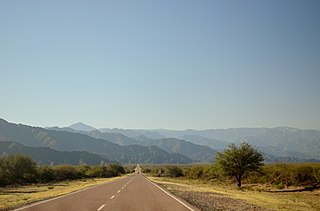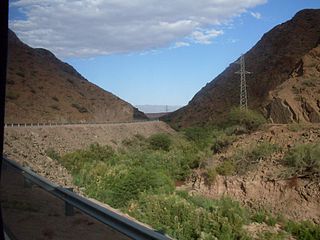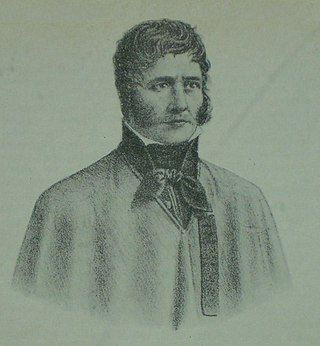
Catamarca is a province of Argentina, located in the northwest of the country. The province had a population of 429,556 as per the 2022 census [INDEC], and covers an area of 102,602 km2. Its literacy rate is 95.5%. Neighbouring provinces are : Salta, Tucumán, Santiago del Estero, Córdoba, and La Rioja. To the west it borders the country of Chile.

La Rioja is a province of Argentina located in the west of the country. The landscape of the province consist of a series of arid to semi-arid mountain ranges and agricultural valleys in between. It is in one of these valleys that the capital of the province, the city of la La Rioja, lies. Neighboring provinces are from the north clockwise Catamarca, Córdoba, San Luis and San Juan. The dinosaur Riojasaurus is named after the province.

An alfajor or alajú is a traditional confection typically made of flour, honey, and nuts. It is found in Paraguay, Argentina, the Philippines, Southern Brazil, Southern France, Spain, Uruguay, Peru, Ecuador, Colombia and Chile. The archetypal alfajor entered Iberia during the period of al-Andalus. It is produced in the form of a small cylinder and is sold either individually or in boxes containing several pieces.
At the national level, Argentina elects a head of state and a legislature. The franchise extends to all citizens aged 16 and over, and voting is mandatory for all those who are between 18 and 70 years of age.

The Argentine Northwest is a geographic and historical region of Argentina composed of the provinces of Catamarca, Jujuy, La Rioja, Salta, Santiago del Estero and Tucumán.
Postal codes in Argentina are called códigos postales. Until 1998 Argentina employed a four-digit postal code for each municipality, with the first digit representing a region in the country, except in the case of the city of Buenos Aires. The unique codes became the base for the newer system, officially called CPA.

The Abaucán is a river in Argentina which flows through the provinces of Catamarca and La Rioja, areas with very low precipitation. The river water is provided by the ingress of two larger rivers, the Fiambalá and the Chaschuil.

Llavallol is a district of Lomas de Zamora Partido in Buenos Aires Province, Argentina. It forms part of the Greater Buenos Aires urban conurbation.
Cacán is an extinct language that was spoken by the Diaguita and Calchaquí tribes in northern Argentina and Chile. It became extinct during the late 17th century or early 18th century. The language was documented by the Jesuit Alonso de Bárcena, but the manuscript is lost. Genetic affiliation of the language remains unclear, and due to the extremely limited number of known words, it has not been possible to conclusively link it to any existing language family.

Lorenzo Barcala, was an Argentine military commander who participated in the Argentine civil wars on the side of the Unitarian Party, and one of the few black soldiers to reach the rank of colonel in that country.

Ángel Vicente "Chacho" Peñaloza was a military officer and provincial leader prominent in both the history of La Rioja province and the Argentine civil wars that preceded national unity.

Juan Felipe Ibarra was an Argentine soldier and politician. He was one of the caudillos who dominated the Argentine interior during the formation of the national state, and ruled the province of his birth for decades.
Martín Yanzón was an Argentine soldier and caudillo who died fighting against the supporters of the dictator Juan Manuel de Rosas.
Tomás Brizuela was a soldier and caudillo in Argentina. He was a lieutenant of Facundo Quiroga in his home province of La Rioja, governor of La Rioja between 1836 and 1841, and died fighting against the dictatorship of Juan Manuel de Rosas.

José Benito Villafañe José Benito Villafane was an Argentine soldier who participated in the war of independence and was governor of La Rioja Province, Argentina, under the protection of the caudillo Facundo Quiroga.

The Decembrist revolution was a military coup in the Buenos Aires Province, Argentina. Juan Lavalle, returning with the troops that fought in the Argentine-Brazilian War, performed a coup on December 1, 1828, capturing and killing the governor Manuel Dorrego and ultimately closing the legislature. The rancher Juan Manuel de Rosas organized militias that fought against Lavalle and removed him from power, restoring the legislature. However, as the coup had reignited the Argentine Civil Wars, Rosas was appointed governor of the Buenos Aires province to wage the war against the Unitarian League. José María Paz made from Córdoba a league of provinces, and so did Rosas. The conflict ended a short time after the unexpected capture of Paz, who mistook enemy troops for his own.
Baltasar de Barrionuevo (1519–1584?) was a Spanish military man, who participated in the conquest of the Peru, Chile, and Tucumán.

Mateo Leal de Ayala (1579-1627) was a Spanish army officer and politician, who served during the Viceroyalty of Peru as alcalde, teniente de gobernador and gobernador of Buenos Aires and Paraguay.
Events in the year 2022 in Argentina.

Jorge Pedro Marchetta was an Argentine professional football player and manager. Marchetta is widely regarded as one of the most charismatic managers in the history of Argentine football.












